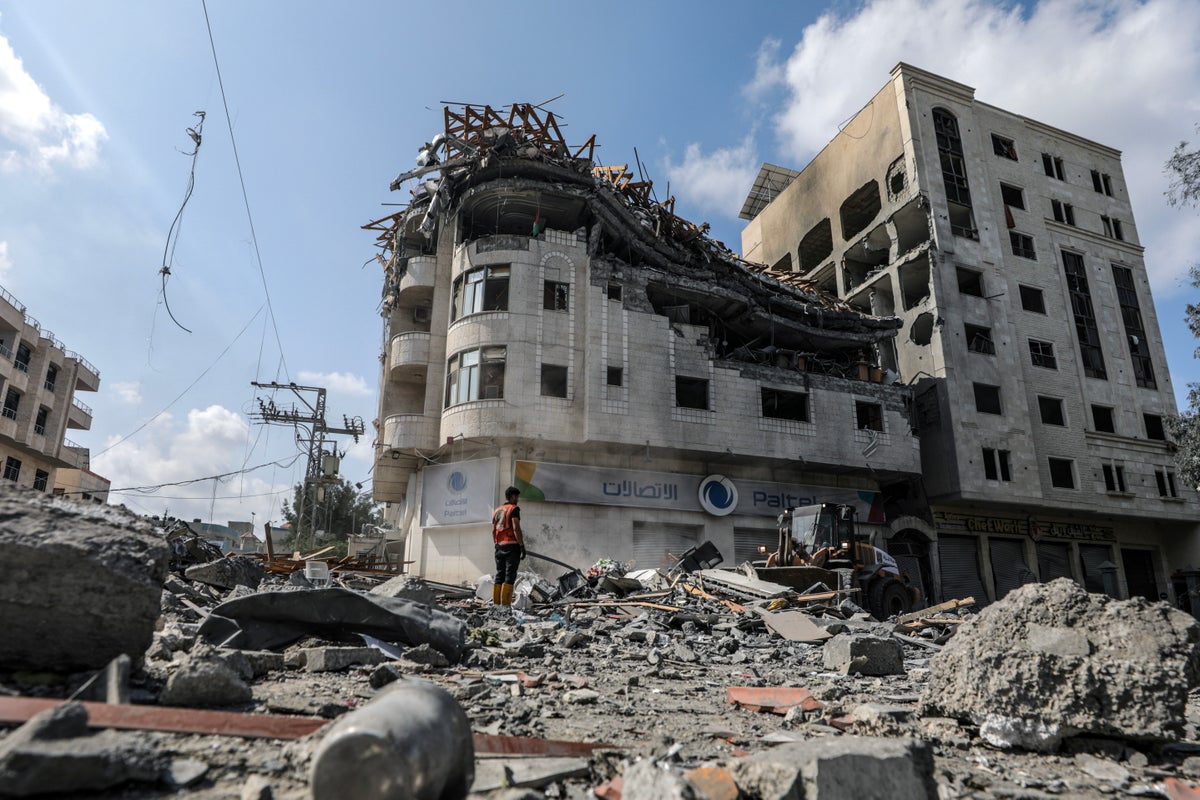
Some Gaza residents are refusing to leave their homes after Israel told 1.1 million people to evacuate by 4pm today ahead of a full-scale ground invasion.
The UN called the order “impossible” to execute, warning it would lead to “devastating humanitarian consequences.”
Mahmoud Shalabi, Director of Medical Aid for Palestinians (MAP), is one of a number of Gazans who will stay put.
A protester climbs a lamp post as people take part in a Palestine Solidarity Campaign demonstration near the Israeli Embassy— (PA)
“Gunpowder is everywhere in the air, and we’re breathing it heavily,” he told The Independent, speaking from his home in the war-torn region.
His colleagues have already lost family members since hostilities broke out. Air strikes have escalated since a Hamas attack on Israel last Saturday which saw 1,300 festival goers and other civilians gunned down.
Some 2,269 Palestinians have been killed in retaliatory attacks, according to unofficial reports.
Mr Shalabi described the non-stop violent bombardment throughout the night as he hid with family in their home: “Air strikes, air raids, bombardment, you name it”.
Despite this, he insists he will not leave. “I will not leave my home. My existence in this home in this piece of land right now, in these difficult times, is a form of public resistance and I will do my best to remain here. I am afraid we will not survive, but I hope I die in dignity.”
According to the Middle East Eye, around 60 per cent of the 2,269 Palestinians killed are women and children— (Ahmed Zakot/SOPA Images/Shutterstock)
A reported 70 Palestinian civilians were killed while evacuating overnight, while a refugee camp was bombed, and various medical centres have been hit by air strikes, according to sources on the ground.
He said that the feeling among citizens is that “nowhere is safe” and that they will be permanently displaced in a “second Nakba”.
Mr Shalabi who is Director of MAP and oversees foreign aid efforts in the region, says that hospitals are “full of dead bodies”, have run out of supplies and the most they can do for the increasing numbers of wounded people is to stop the loss of blood as queues for emergency care and operations pile up.
“People are carrying dead bodies in their cars because ambulances are being targeted, it’s a dire situation,” he says.
This comes after the Director of Al Shifa, the largest hospital in Gaza rejected Israel’s order to evacuate. He says there are no painkillers, no ATMs, and no bread - the World Health Organisation warned that the evacuation order amounted to a “death sentence” for vulnerable hospital patients including babies dependent on machines and medication.
One senior UN official said that the humanitarian situation in Gaza was “unprecedented” and “indescribable” as others called for a de-escalation of the conflict after water ran out only hours ago.
Benjamin Anthony, a spokesman for the MirYam Institute said in an interview to Sky News that restoring Israel’s security would be the government’s top priority over humanitarian aid as their country reeled from Hamas attacks over the last weekend.







